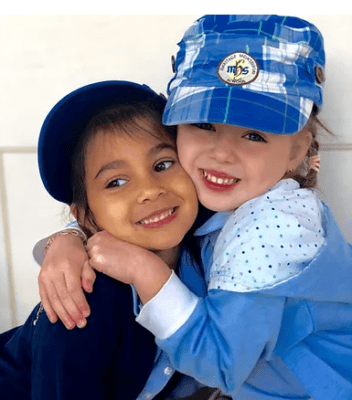Love is in the air! Here at Heritage, we love spreading acts of kindness all year long, not just during the holidays or Valentine’s Day. Here’s some tips to make kindness and gratitude a part of our every day!

Child Development and Kindness
While feelings of kindness are natural abilities that all children possess, the expression of kindness has to be learned and cultivated. Acts of kindness are first learned through parents and then from people in the child’s environment. Acts of kindness, or “prosocial behaviors,” are voluntary acts that are intended to benefit another person. Kindness is part of our biology; even rodents exhibit prosocial behaviors. For example, in a study where a rat had to choose between freeing a trapped cage-mate or opening a box of chocolate, the rat chose to free the cage-mate first and then not only open the chocolate box, but also share the chocolate with the newly freed friend.
Kindness isn’t only good for the person receiving the kindness, but it’s also good for your health! Kindness has been linked to increased happiness and self-esteem!
How can we spread that kindness to our children, homes, and schools?

Teaching Acts of Kindness
Let kindness start with you! Teaching kind behaviors can be a great start, but also remember that children learn behaviors by watching how people around them behave. Increasing your kindness not only can make you and those around you happier, but it also sets a great example for your child! Harvard Graduate School of Education’s Making Caring Common Project agrees; children that can understand and exhibit empathy and take responsibility for others are likely to be happier, more successful, and have better relationships throughout their lives, including as adults.
Teach kindness in your home with these helpful, Heritage Montessori approved tips!
-
Express Gratitude. Teach children to say please and thank you when asking or receiving anything.
-
Create your own Grace and Courtesy lessons. Create a Montessori-inspired Grace and Courtesy lesson to teach your children to help set the table, bring dirty dishes to the sink, or help pick up toys. At Heritage, we utilize opportunities to build self-esteem and kindness. For example, we appoint students to an assigned job for the day to create opportunities to practice caring, gratitude, and accountability. Giving children responsibilities helps them be accountable for their actions and recognize opportunities to help others. Create high ethical standards in the daily activities that take place in your home. You’ll know it’s working when a parent recognizes your child’s helping hand after a play date!
-
Involve children in your acts of kindness. When you express your gratitude or kindness, let your children help out! Children’s tiny fingers can lend a helping hand tying bows on presents; they can help bake treats for a sick neighbor or even create a card for a family member or friend in need. This can also be a great way to spend quality time and enhance your bond with your child!
-
Teach Respect. Teach children to address others, particularly adults, in conversation respectfully. Utilize this opportunity to teach about interrupting as well. Respect doesn’t have to be formal; scheduling regular time together and engaging in meaningful conversation without electronics, particularly at dinner time, reinforce respectful behaviors and enhance the bond between the whole family.
-
Enforce honesty and humility. Everyone makes mistakes, but it’s how we grow from those mistakes that shows the type of person we are. Cultivate the person you want your child to become right from the start! When your child makes a mistake, turn the situation into a learning opportunity to discuss honesty and how to learn from the mistake and do better next time.
-
Get involved! Engage in community service and involve your child! At Heritage, we believe in a well-rounded, comprehensive learning environment that includes community service. Utilize our community outreach events to teach your child about service. For example, let your child choose an old toy to donate at our annual toy drive.


Final Thoughts
Kindness doesn’t just benefit the people receiving gifts and kind actions, but it also makes the person giving the act of kindness happier as well! With a Montessori approach to learning and child development, simple, every day activities become opportunities for learning how to be a successful person in today’s society. Thank YOU for spreading kindness and making our school a better place to learn and grow!


